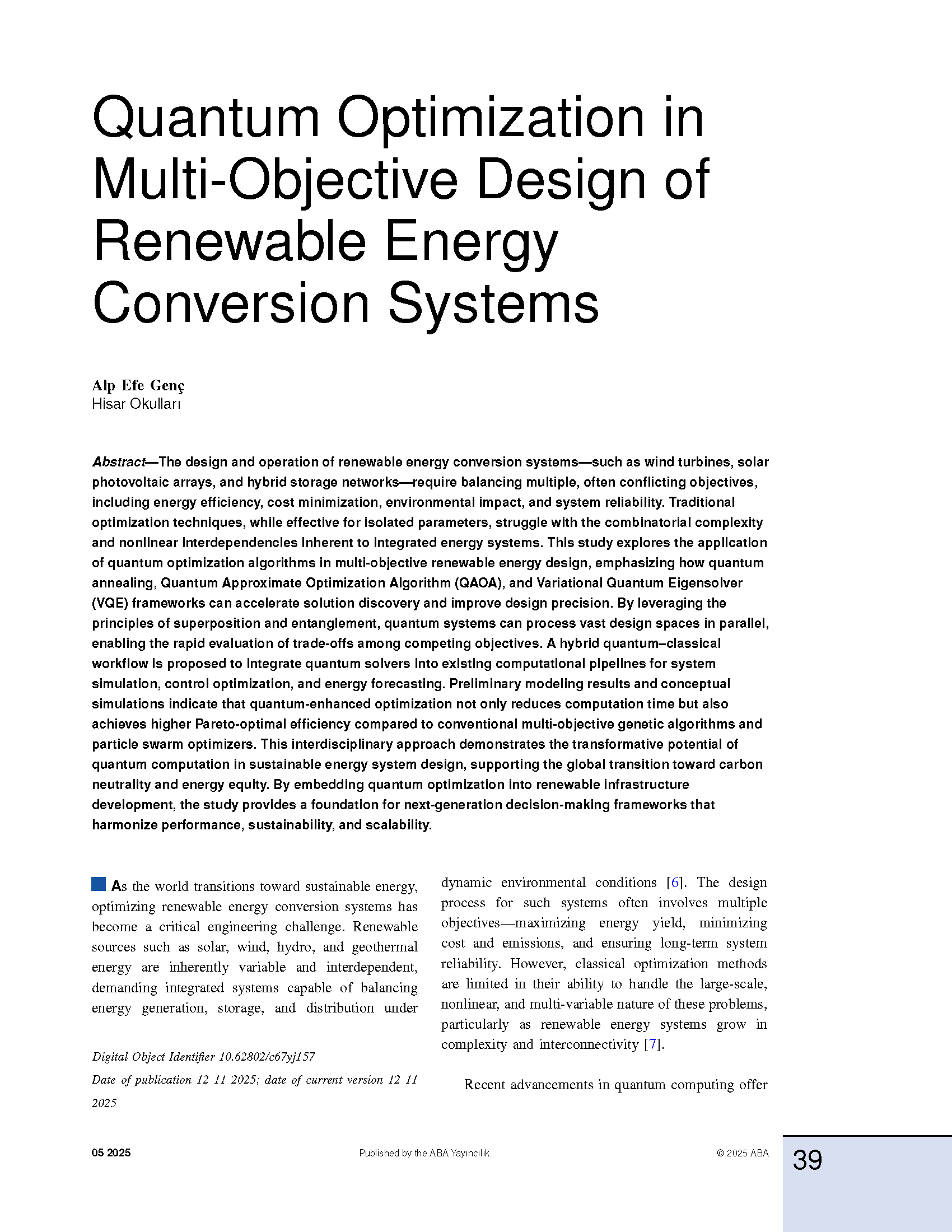Quantum Optimization in Multi-Objective Design of Renewable Energy Conversion Systems
DOI:
https://doi.org/10.62802/c67yj157Keywords:
quantum optimization, renewable energy systems, multi-objective design, hybrid quantum–classical algorithms, sustainable engineering, quantum annealing, QAOA, Pareto optimizationAbstract
The design and operation of renewable energy conversion systems—such as wind turbines, solar photovoltaic arrays, and hybrid storage networks—require balancing multiple, often conflicting objectives, including energy efficiency, cost minimization, environmental impact, and system reliability. Traditional optimization techniques, while effective for isolated parameters, struggle with the combinatorial complexity and nonlinear interdependencies inherent to integrated energy systems. This study explores the application of quantum optimization algorithms in multi-objective renewable energy design, emphasizing how quantum annealing, Quantum Approximate Optimization Algorithm (QAOA), and Variational Quantum Eigensolver (VQE) frameworks can accelerate solution discovery and improve design precision. By leveraging the principles of superposition and entanglement, quantum systems can process vast design spaces in parallel, enabling the rapid evaluation of trade-offs among competing objectives. A hybrid quantum–classical workflow is proposed to integrate quantum solvers into existing computational pipelines for system simulation, control optimization, and energy forecasting. Preliminary modeling results and conceptual simulations indicate that quantum-enhanced optimization not only reduces computation time but also achieves higher Pareto-optimal efficiency compared to conventional multi-objective genetic algorithms and particle swarm optimizers. This interdisciplinary approach demonstrates the transformative potential of quantum computation in sustainable energy system design, supporting the global transition toward carbon neutrality and energy equity. By embedding quantum optimization into renewable infrastructure development, the study provides a foundation for next-generation decision-making frameworks that harmonize performance, sustainability, and scalability.
References
Adebayo, D. H., Ajiboye, J. A., Okwor, U. D., Muhammad, A. L., Ugwuijem, C. D., Agbo, E. K., & Stephen, V. I. (2025). Optimizing energy storage for electric grids: Advances in hybrid technologies. management, 10, 11.
Khan, A., Bressel, M., Davigny, A., Abbes, D., & Ould Bouamama, B. (2025). Comprehensive Review of Hybrid Energy Systems: Challenges, Applications, and Optimization Strategies. Energies, 18(10), 2612.
Li, Y., Zhou, T., & Jin, G. (2025). The research progress on multi-energy system integrated stability: Modeling methods, stability analysis, and coordinated control strategies. Advances in Resources Research, 5(4), 2409-2453.
Mohammed, M. Q., Meeß, H., & Otte, M. (2025). Review of the application of quantum annealing-related technologies in transportation optimization. Quantum Information Processing, 24(9), 296.
Naayini, P., Bura, C., & Jonnalagadda, A. K. (2025). The convergence of distributed computing and quantum computing: A paradigm shift in computational power. International Journal of Scientific Advances (IJSCIA), 6(2), 265-275.
Shafiei, K., Seifi, A., & Hagh, M. T. (2025). A novel multi-objective optimization approach for resilience enhancement considering integrated energy systems with renewable energy, energy storage, energy sharing, and demand-side management. Journal of Energy Storage, 115, 115966.
Shehata, A., Groszkowski, P., Naughton, T., Meena, M. G., Wong, E., Claudino, D., ... & Beck, T. (2026). Bridging paradigms: Designing for HPC-Quantum convergence. Future Generation Computer Systems, 174, 107980.


